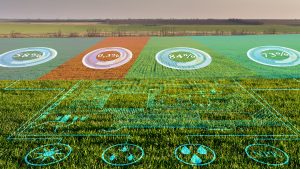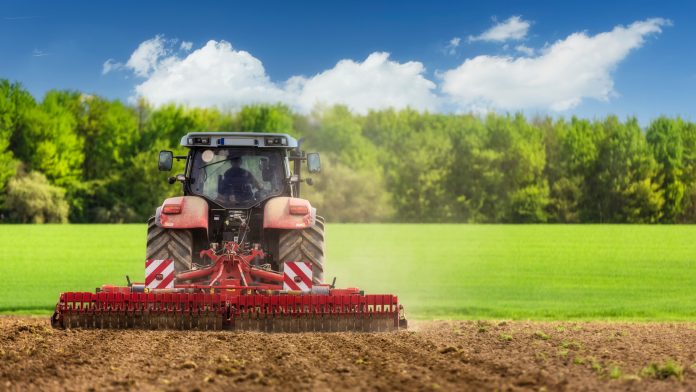Patrick Holden CBE, Founder of the Sustainable Food Trust, spoke to The Innovation Platform’s International Editor, Clifford Holt, about issues such as the Agriculture Bill, Brexit, and the ‘land sharing’ versus ‘land sparing’ debate.
In response to the worsening human and environmental crises that are associated with the vast majority of today’s food and farming systems, Patrick Holden CBE founded the Sustainable Food Trust (SFT) in 2011. The organisation envisions a world in which food and farming systems that nourish the health of the planet and its people are firmly in place.
In order to accelerate the transition to more sustainable food and farming systems, the SFT works catalytically on a global scale to influence and enhance the work of other organisations, rather than replicating existing initiatives.
The Innovation Platform’s International Editor, Clifford Holt, spoke with Holden about some of the SFT’s goals, as well as his thoughts on issues such as the Agriculture Bill, Brexit, and the ‘land sharing’ versus ‘land sparing’ debate.
Could you begin by outlining the work and role of the Sustainable Food Trust? How do you operate, and what do you hope to achieve?
In the UK, the Sustainable Food Trust is a recognised charity, and in the USA, we are a c3 not for profit organisation. We also operate throughout the wider world. I established the organisation in 2011 when I left the Soil Association, where I had been for some 20 years.
During my time at the Soil Association, I had developed a range of contacts with both individuals and organisations all over the world, and we had been quite successful within the context of organic farming to develop standards and promote a separate market based on the standards we had worked on in the 80s and 90s. That market and the standards underneath it became a framework to enable thousands of farmers and growers throughout the world to operate in a more sustainable and regenerative way in order to remain economically viable.
Towards the end of my time at Soil Association, I had come to realise the threats posed by climate change, biodiversity loss, and all the other existential threats that confront us, necessitate a more inclusive approach. Indeed, it had become increasingly evident that unless the whole of agriculture, both locally and globally, transitioned to systems of food production which rebuilt the natural capital we had lost during my farming lifetime, then we might end up making our planet uninhabitable.
At this time, I was approached by some of those who had backed me while I was with the Soil Association and who suggested that I form an organisation with a mission which is related to those aims and objectives. The result was the Sustainable Food Trust. Our mission is to accelerate the transition towards more sustainable food systems, and while we have a particular emphasis on Europe and North America, our mission is truly global.
We work on three levels, essentially attempting to be a catalyst for change. These are:
- To seed new thinking and new ideas amongst individuals and organisations in leadership positions;
- To produce evidence where necessary to support the need for more regenerative and sustainable food systems, thereby hopefully influencing policy and other forms of support for those systems; and
- To inform and educate public opinion because we believe that, in the end, their role as consumers and electors needs to be the wind in the sails that produces lasting change.
Given the importance of consumers, would you agree that it is the cost of things like organic products that poses the most significant barrier to a wider societal adoption?
You are asking exactly the right question. Many of us have spent the last 20 or 30 years trying to promote an alternative system which incorporates many of the key characteristics of regenerative and sustainable food systems. However, despite this effort – and the clear benefits of the new system – they are not yet mainstream, and we need to ask why.
The answer to that question is multifaceted, and there are perhaps three or four critical barriers to change, principle amongst which is financial. It is the Sustainable Food Trust’s mission to unlock those barriers. We have been investigating the financial barrier, of course, and it is clear that, quite simply, farming in a sustainable and regenerative way doesn’t pay as well as farming in a way that exploits natural and human capital, which pollutes in terms of greenhouse gas emissions, water pollution, and so on, and which damages public health; producing food that is good for you and the planet is more expensive than producing that which is probably going to damage environmental and human health, which is both strange and wrong.
There are multiple reasons for this, including the absence of true cost accounting, the fact that the polluter pays principle is not being applied, and the misdirection of subsidies, amongst others. Unlocking that key barrier to change would transform the future of sustainable agriculture.

Where would you like to see the emphasis being placed in the search for solutions to these challenges?
As mentioned, the first barrier to change is financial, and so we need to create a situation where it pays better to farm in a sustainable and regenerative way. There are numerous terms and buzzwords being used today – organic, biodynamic, sustainable, agro-ecological, regenerative, and so on – but in many ways the terms don’t matter; what matters is the development and successful implementation of a system which addresses the aforementioned threats and provides the necessary paradigm shift so that instead of mining natural and human capital and polluting the environment, the capital we have lost is rebuilt.
One solution is to explain why we have a dysfunctional economic system that doesn’t capture the hidden costs, and then we need to do something about it. In 2017, we published a report called ‘The hidden cost of UK food’. This revealed that for every pound spent on food in the marketplace, there is another hidden pound. The consumer pays this through things like taxation, charges in their water bills, and others, but they simply don’t know they are paying it. The impacts of this cost are split almost evenly between damage to the environment and the depletion of natural capital on the one hand, and damage to public health on the other.
Our report, which was refreshed in 2019, tracks these various monetised negative impacts and posits that the obvious solution to the problem posed by dishonest food pricing is to ensure that the polluter pays. In the future, farmers need to be made financially responsible for the negative impacts of their farming practices, if any, while those who build both natural and human capital and avoid pollution should be financially rewarded for doing so. This should not only be through the marketplace but also through redirected subsidies (which Brexit has the potential to enable), as well as through other mechanisms, too; farmers could act as carbon or biodiversity stewards, for instance, and be paid for it.
What technological advances and innovations do you feel could have a positive impact on the agriculture sector?
There are potentially tremendous advantages to be had from new technological innovations which can support the transition towards regenerative farming systems. However, the key is to ensure that we use the right technologies, and that can be achieved by putting them under the spotlight in order to differentiate between those which are helpful and which are progressing in the right direction, and those which are not. We need to ask what the impact of a particular technology would be on the environment, on natural capital, and on public health, etc. if we applied it widely in agriculture. Whether the technology is then used would depend on the answers to those questions.
These questions should be asked for all new technologies, and it is clear that there are many new innovations out there – from those which can measure the impact of agriculture through, for instance, the carbon level in soil, to the use of AI to identify different plant species in a photograph, to precision, camera-driven weeding equipment and even robotic milking. However, their benefits should be explored before they are rolled out.
To what extent do you think gene editing and genetic engineering would benefit agriculture?
While I personally don’t see that genetic engineering has any major part play in the future of plant and animal breeding, I can see the attraction of gene editing. I also believe that we need to broaden the discussion.
There has been a catastrophic decline in biodiversity in recent years, and that is not only with regard to the biodiversity which used to coexist with farming but also the biodiversity of plants and animals that are actually used in agriculture. This has resulted in a narrowing of the gene pool, which makes those plants and animals extremely vulnerable to things like climate change. We therefore need to widen the gene pool as we move forwards, not narrow it further. With gene editing, it would seem that one of the attractions is the potential to develop a breed of plant or animal which is resistant to disease and which is much more productive than those currently being used. If that happens, however, and they become widely adopted, it will make the problems posed by a shrinking gene pool even worse.
We also need to be mindful of the emergent science of epigenetics, meaning that we need to be cognisant that all organisms constantly adapt to the environmental influences around them during their lifetimes through gene expression. As farmers and growers, we should therefore be breeding our own replacements which will then incorporate the influence of epigenetics. The current thinking about gene editing doesn’t appear to take that into account.
Is there is a need to establish comprehensive gene banks?
This kind of Noah’s Ark idea has its uses, and I do believe that we need to save the last genes because otherwise we will lose them all together. What I am as – if not more – interested in, however, is how we can apply our incredible understanding of the genome combined with the science of epigenetics to better inform farmers about how they can properly harness this technological understanding to breed plants and animals which are adapted to their own unique environment. This is important because every farm has its own ecosystem.
You have called for a policy approach that makes ‘all farms more productive, sustainable, and nature friendly’. What, then, are your thoughts on the Agriculture Bill?
Assuming that Brexit goes ahead, we need an Agricultural Bill to replace the Common Agricultural Policy (CAP). The House of Lords recommended some very helpful amendments to Agricultural Bill. However, these were thrown out by the House of Commons seemingly because they will inhibit the government and restrict its hand in negotiating a trade deal with the EU. I believe it would be a real shame if the UK government negotiated away a chance to protect UK farmers from lower standards which damage natural and human capital and pollute the environment in order to obtain a licence to export, for instance, agricultural machinery or products. Of course, that is not to say that the UK should not be looking to export its products; just that this should not be at the detriment of farmers and the British agricultural sector as a whole.
In my view, we need an Agricultural Bill which sets the stage for a completely new era of trade in agricultural products and foods. This should be based on a tariff-free, open trading environment for any food that is produced in a truly sustainable way, with taxes and tariffs imposed on the trade of any food stuff which causes pollution, contributes to climate change, or degenerates natural and/or human capital. That would be a truly enlightened platform for trade. Unfortunately, the one that is currently being negotiated by the UK government is the opposite.

How do you think the UK agriculture sector will be affected by Brexit once it is no longer governed by the CAP?
This is essentially impossible to predict because it depends on what happens with the EU negotiations, as well as on the deal, if any, which arises with the USA and other countries via the bilateral trading agreements. Nevertheless, it is almost a certainty that Brexit will impact consumers as a result of tariffs and quid pro quo arrangements. It is, however, conceivable that UK farmers might benefit, at least in the short term, because imports could become more expensive.
If the new trading agreements are to be based on truly sustainable agriculture as a baseline, then they could be brilliant. If they are not, and if they continue to fail to take issues such as climate change and irreversible biodiversity loss into account, then their impact will be negative rather than positive.
What lessons have been learned from the COVID-19 pandemic in terms of things like food security? How do you feel things need to change moving forwards in order to ensure that the UK can support itself in times of crisis?
COVID-19 has taught us many things. Regarding the food security issue, the UK Government claimed that our highly centralised and ‘just in time’ food systems – which now dominate, and which enable supermarkets to keep their shelves more or less fully stocked – was a great success. However, there is an underlying opposite truth that contradicts this, which is that if the UK’s supply chains were interrupted much further, serious shortages would have been experienced and we could have witnessed a food security emergency.
This is because, since the end of the Second World War, the latticework and infrastructure of small scale processing and distribution systems which used to be at the very core of UK food security has been all-but dismembered.
For example, I used to grow carrots in west Wales, and the carrots were packed for most of the UK supermarkets at a location just six miles away. The supermarkets’ category management policy then resulted in the closure of all the regional packing houses, which means that if I want to send carrots to a supermarket now, then they have to first go to Peterborough to be packed, which is 230 miles away. The same applies to almost all other agricultural products, from cattle being sent to a slaughterhouse or milk sent for bottling; it is all processed in a highly centralised way, and while there are international transport networks etc. now in place, if they are impacted by something like the coronavirus pandemic, which saw travel corridors closed and logistics pipelines impacted, then we start to see serious problems.
We have seen pandemics in livestock before – the Foot and Mouth pandemic, swine flu, bird flu, and so on – and one of the antidotes is to look after the local health of plants, soils, animals, and people. Indeed, the preconditions for major damage stemming from a pandemic are weakened animal health and centralised food systems, and both of those are in place at the moment, which means that diseases such as COVID-19 can, and do, spread easily.
The Environment Secretary Michael Gove has asked Henry Dimbleby to lead a year-long review which should go on to form the basis of a National Food Strategy. What would you like to see being included here?
We have industrialised farming in the UK, and we feed the whole population with highly processed food from intensive agriculture. The results of that are now beginning to emerge. And while we do therefore need a National Food Strategy, there is a sense that the government perhaps should have identified ways to deal with the issues around primary food production before asking Dimbleby to tell us what is going to happen to our food. Nevertheless, it is great to see this review happening, and it will be very interesting to see what Dimbleby prescribes.
His attempt to connect with schools is particularly important, but this needs to go deeper. That is, it is not enough just to say that schoolchildren need to eat more fruit and vegetables; we need to focus on the way the food they eat has been produced. As such, food education should be re-embedded into the curriculum and culture, because it has completely disappeared from both. This is also true of medical education, with almost no trainee doctor receiving education on nutrition, let alone primary agriculture. Hopefully, Dimbleby will be able to address some of these issues.
Dimbleby is in a difficult political environment as he is also caught up in the discussion around the issue of ‘land sparing’ versus ‘land sharing’. This concerns the question of what we should eat in order to be healthy and sustainable, and there is a global debate taking place around how we can feed a growing population. One answer is to intensify on the best land and then rewild the rest. This is the ‘land sparing’ approach that is taken by such influential figures as George Monbiot and David Attenborough. The other answer is to produce more food on more land but to ensure that this is done in harmony with nature and biodiversity, which is the ‘land sharing’ approach, which I advocate.
Within this debate, public opinion is being influenced in favour of the land sparing approach by not only people like David Attenborough, for whom I have the utmost respect, but also by many from within the scientific community and the policymakers, and those arguments are therefore winning. Linked to those arguments is a proposed move towards a plant-based diet, with people eating far less meat. Yet, those who are in favour of this are quite substantially wrong in a number of key areas, and Dimbleby is in the middle.
From my perspective, I believe that if you further intensify on the best land, it will produce degraded food and we will not be able to produce enough of it. That will force people to eat plant-based diets because the farming systems, which are part of the intensification, will further degrade soil carbon, making us even more dependent on an agricultural system which is damaging to our health as well as the environment and, indeed, which is not sustainable in the long term.
If a land sharing approach were taken, however, the biodiversity would be able to coexist with food production. This would, of course, require a return to what I refer to as ‘mixed farming’, which is based on crop rotations with a fertility building element that is nearly half of the total timespan of the rotation. This would involve areas of mostly clover and grass, and grazing ruminants are required to turn that into food. And the fact that these animals have recently received negative attention in relation to their methane emissions etc. demonstrates that there has been a failure to differentiate between the livestock we need to eat less of – such as industrially-produced chickens, pigs, and dairy products from mega dairy farms – and the livestock products that we actually need to eat possibly more of, such as the mainly grass-fed ruminant products from mixed farming systems.
This, of course, is not mainstream thinking, and that is perhaps why there are so many people, particularly amongst the younger generations, who mistakenly believe that eating a mainly plant-based diet is the best solution, because that is certainly not the case from a sustainable agriculture point of view.
Given the many challenges we have discussed, where will the SFT’s priorities lie moving forwards? Do you anticipate any specific challenges ahead?
Challenging the views on land sparing is going to be tough. But it must be done because I do not believe that it will feed the world in a in a healthy and sustainable way. The EAT-Lancet report has also essentially followed that approach, arguing that people need to cut their meat consumption by 50% and that they should eat chicken rather than red meat if they are going to eat meat at all. It is important that we unravel the elements of these reports, which I believe are wrong, and then explain, in simple and easily-accessible language, what the public needs to do if they want to be part of the solution. That is not an easy task, and it will take some time to achieve, but it is something that we have to do if we want to continue to have a habitable planet.
Patrick Holden CBE
Founder
The Sustainable Food Trust
+44 (0) 117 987 1467
info@sustainablefoodtrust.org
Tweet @SusFoodTrust
https://sustainablefoodtrust.org/about-us/contact-us/
Please note, this article will also appear in the fourth edition of our new quarterly publication.





